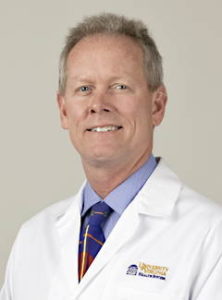By Thomas L’Ecuyer, MD, Division Chief of Pediatric Cardiology

Dr. Thomas L’Ecuyer
Q: Please briefly summarize your program.
A: UVA has had a pediatric heart failure and transplant program for many years. In 2011-12 the leaders of the pediatric congenital heart program, Drs. Gangemi and Matherne, decided that the complexity of the surgical program had reached the point where further growth and improvement of the program would benefit from additional experience in heart failure and transplant. I joined the cardiology division later that year to lead this effort.
Our program at the time was performing 1 or 2 transplants per year. We decided to partner with institutions in the state to centralize the evaluation, listing, and post transplant care of these children at UVA. We have developed these partnerships and now are the only center performing pediatric heart transplants in the state, averaging 9 transplants per year.
We now offer pre and post transplant care for these children in Norfolk and Winchester, in addition to Charlottesville, and are looking to develop additional partnerships throughout the state. We care for children with highly complex conditions, providing ABO incompatible transplant for infants, desensitization for those with high antibody loads against tissue types, and mechanical support of the circulation. We have a daily average inpatient census of 4 children who are either waiting for a transplant or have received one and are recovering or being treated for a complication.
We have recruited 2 additional cardiologists to help care for these complex patients, Drs. Mike McCulloch and Shelby White, and have 2 dedicated nurse practitioners and a social worker on the team.
Q: What makes your program stand out?
A: Our program stands out because of its teamwork ethic among physicians and advance nurse providers in cardiology, congenital cardiac surgery, and cardiac intensive care. The patient comes first and we try to have the person with the most expertise for a given problem direct the care.
We have developed as a team a great ability to recognize a child who is failing conventional surgical or medical treatment of their heart condition and therefore needs to be evaluated for advanced treatment including transplant. Once a team decision has been made to evaluate for transplant, we expeditiously work with the family to get the patient listed for transplant to reduce the chance of dying while waiting. We work collaboratively to support patients awaiting transplant and minimize complications that may make patients poor candidates and are aggressive in evaluation of organs we are offered.
I believe it is important to the institution to be able to provide this type of service because it makes it possible to take on more complex cases and more severely ill children since we have advanced heart failure therapies available.
Q: What do you feel is the most exciting part of your work?
A: The most exciting thing about the work for me is being able to work with young families with a desperately ill child and to give them hope. These are young people who did not plan to have a child that would need a transplant, but are able to face the problem with courage and dignity. I have benefitted immensely from my interactions with these hero parents. Being able to help coach them and care for their kids through some very dark hours is very gratifying. I also am constantly learning in this role, so I never feel like my job is becoming rote or routine.
Our outcomes have been excellent, and this fuels the passion I have for caring for this patient population. We have a fellowship training program that allows us to pass on to the next generation an approach to caring for these complex kids.
Q: Is there one story that really stands out to you?
A: All of the stories of the patients I’ve met start with a horrible event or disease discovery, include some desperate times, and develop into an inspiring story of a family that lived through a potentially devastating trial. Not all of our patients have survived to receive a transplant, and some of these are the most memorable for me because it indicates we have more work to do to accomplish our goal of being able to tell any parent of a child with end stage heart disease that things will turn out well for their child.
Q: What have you learned from this program/project that you’d want to share with others in the department?
A: The program has been and will continue to be successful because it is part of the children’s heart program that provides superior care for children with heart disease. Each member of the cardiology group, ICU group, and cardiac surgical group has unique expertise that they have added to help identify candidates for advanced heart failure treatment, support families while awaiting transplant, and provide care post transplant. The quality of the people I get to work with is superb and, without them, the heart failure/transplant program would not succeed. It is a pleasure for me to come to work each day and interact with the entire team.
Filed Under: Features
Tags: TL4XK
